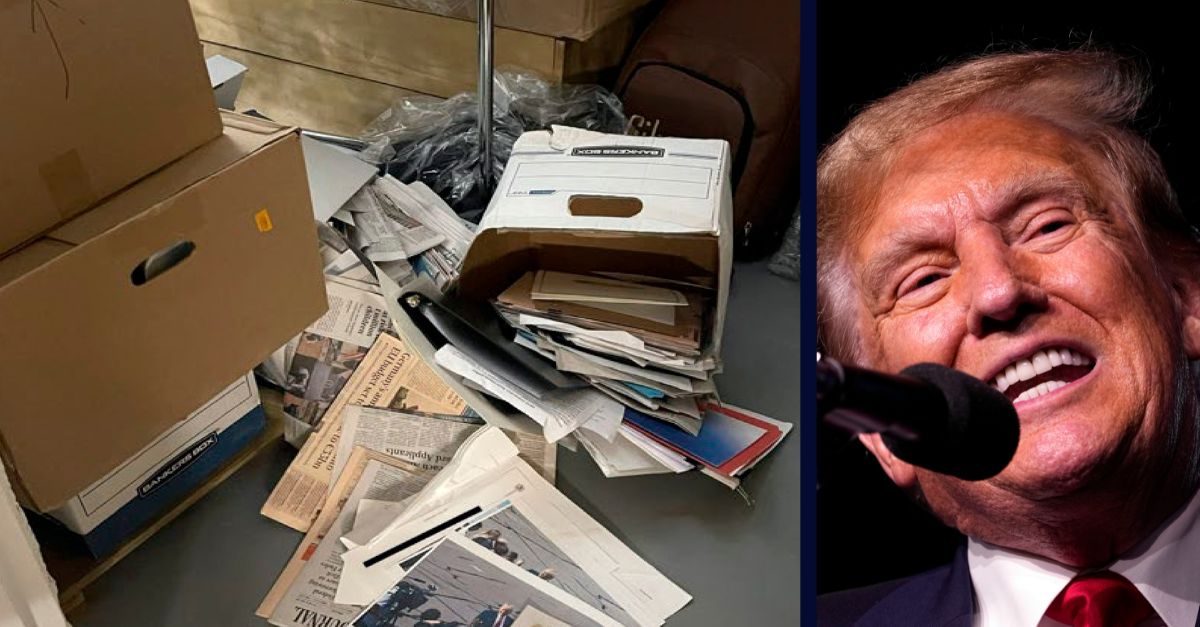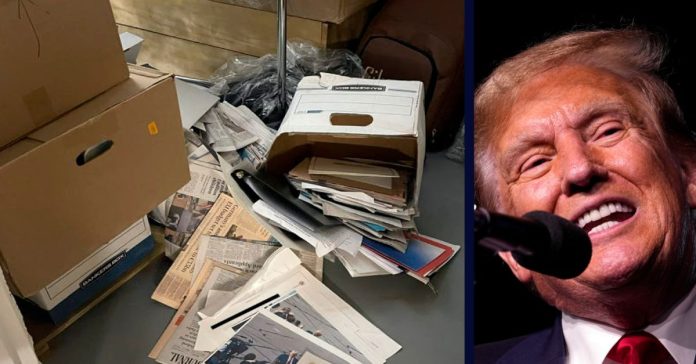
Left: This image, contained in the indictment against former President Donald Trump, shows boxes of records on Dec. 7, 2021, in a storage room at Trump’s Mar-a-Lago estate in Palm Beach, Fla., that had fallen over with contents spilling onto the floor. (Justice Department via AP). Right: Republican presidential candidate former President Donald Trump speaks at the National Religious Broadcasters convention at the Gaylord Opryland Resort and Convention Center Thursday, Feb. 22, 2024, in Nashville, Tenn. (AP Photo/George Walker IV).
While defense lawyers and federal prosecutors await a decision from the Supreme Court on whether it will consider Donald Trump‘s invocation of “absolute immunity” from criminal prosecution as a former president, his attorneys have asked the federal judge overseeing his criminal classified documents case in Florida to dismiss the charges there on similar grounds.
The 22-page motion was part of multiple filings Trump’s legal team made under orders from U.S. District Judge Aileen Cannon. The immunity argument in particular represents one of Trump’s last best hopes to evade prosecution overall, an expert recently told Law&Crime,
Trump is facing 40 charges in federal court in Florida for allegedly hoarding top secret and classified documents at his Mar-a-Lago property in West Palm Beach after he left the White House in 2021. Some of those records included highly sensitive and closely guarded information like details about U.S. nuclear capabilities and U.S. spy programs. Trump is also facing obstruction charges for allegedly preventing the federal government from trying to claw the documents back. He and his co-defendants, aide Waltine Nauta and Mar-a-Lago maintenance manager Carlos De Oliveira, have pleaded not guilty to all of the charges.
According to the motion to dismiss on immunity grounds, Trump asked Cannon to drop 32 of his charges because he designated the records in question as “personal” documents before leaving the White House. This is a power afforded to him by the Presidential Records Act and falls under the umbrella of his “official” duties or the “outer perimeter” of them, attorneys Todd Blanche and Christopher Kise argue.
He dove into the PRA more thoroughly in a separate motion also filed late Thursday.
The timing of the taking of the documents is key in Trump’s immunity defense. He argues that special prosecutor Jack Smith highlighted in the indictment that the records were “packed and shipped ‘[i]n January 2021, as he was preparing to leave the White House.’ President Trump departed the White House prior to ’12 p.m. on January 20, 2021,’ and as such he is alleged to have made these decisions concerning the documents at issue while he was the Commander-in-Chief,” Blanche wrote.
Indeed, Trump’s lawyers argue, there is an “unbroken tradition” dating back the landmark 1803 case of Marbury v. Madison — which established the judiciary’s power to determine the constitutionality and validity of acts of the executive and legislative branches of government — of decisions determining that federal courts “lack authority to sit in judgment directly over a president’s official acts.”
Even if federal courts “sometimes review the validity of the official acts of subordinate executive officials below the president,” the defense argues, the “authority of judicial review of the official acts of subordinate officers has never been held to extend to the official acts of the president himself.” [Emphasis in original.]
Instead, the nation has a “‘historical tradition … implicit in the separation of powers’ that a President may not be ordered by the Judiciary to perform particular Executive acts.”
Smith, however, is trying to undermine that history, Trump’s lawyers say.
“[T]he authority asserted by the Special Counsel here — to put a president on trial, enter a criminal judgment against him, and punish him with imprisonment or other criminal penalties, all for his official acts — constitutes a core violation of the separation of powers.”
Accordingly, the recent unanimous decision from the D.C. Circuit finding that Trump was not immune from prosecution was made in error and “poorly reasoned,” they contend — and could potentially pave the way to a bleak future.
“Without immunity from criminal prosecution, the President’s political opponents will seek to influence and control his or her decisions via de facto extortion or blackmail with the threat, explicit or implicit, of indictment by a future, hostile Administration, for acts that do not warrant any such prosecution,” Blanche wrote. “This threat will hang like a millstone around every future President’s neck, distorting Presidential decisionmaking, undermining the President’s independence, and clouding the President’s ability ‘to deal fearlessly and impartially with’ the duties of his office.””
The motion also requests a hearing on the immunity issue, in particular.
This story is developing.
Have a tip we should know? [email protected]

